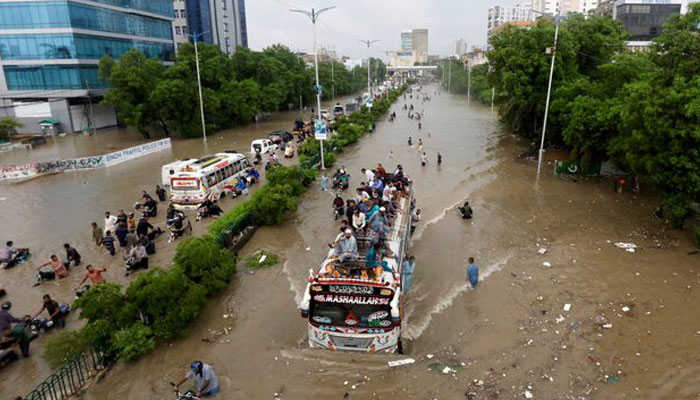Climate change mitigation gets Rs2.78bn out of PSDP outlay
Proposed climate development budget includes Rs2.73 billion in domestic funding and Rs50 million in foreign aid
ISLAMABAD: Despite recurring climate-related disasters, the federal government has allocated just 0.22 percent of its total Public Sector Development Programme (PSDP) outlay—Rs2.78 billion out of Rs1,287 billion—for the Ministry of Climate Change and Environmental Coordination in fiscal year 2025–26, reflecting a Rs640 million cut compared to the revised allocation of Rs3.42 billion in the outgoing year.
According to official budget documents, the proposed climate development budget includes Rs2.73 billion in domestic funding and Rs50 million in foreign aid.
The reduced allocation comes at a time when Pakistan is experiencing more frequent urban flooding, extreme heatwaves, glacial lake outbursts, and rising pollution—phenomena that demand increased investment in climate resilience and preparedness.
The largest share of the funding, Rs2.25 billion, has been earmarked for the Green Pakistan Programme (Phase-I), down significantly from Rs3.29 billion in the outgoing year. This project, part of a broader afforestation and ecosystem restoration drive, remains a flagship initiative despite budgetary downsizing.
Another Rs325.26 million has been allocated for strengthening the technical capacity of the Ministry of Climate Change and Environmental Coordination, reflecting an emphasis on improving climate governance, planning, and institutional efficiency.
Other allocations include Rs83.39 million for the Pakistan Biosafety Clearing House for GMOs Regulation (Pak-BCH), and Rs25 million for capacity building on water quality monitoring and Sustainable Development Goal (SDG) 6.6.1 reporting.
Two new initiatives have also been introduced: Rs50 million for Green Skills and Green Entrepreneurship, and another Rs50 million for the formulation of a National Urban Strategy to address urban flooding, droughts, and climate-induced risks.
Notably, the Climate Resilient Urban Human Settlement Unit, which received Rs21.4 million in the current year, has not been allocated any funds for 2025–26. The omission raises concerns about the continuity of sustainable urban development programmes, especially in cities like Karachi, Lahore, and Peshawar, which are increasingly vulnerable to climate shocks.
With the total PSDP spending for 2025–26 set at Rs1,287 billion, the climate change portfolio remains underfunded relative to its critical importance.
Experts warn that reduced domestic climate investment could also undermine Pakistan’s ability to access international climate finance through mechanisms such as the Green Climate Fund and the Global Environment Facility.
Pakistan is globally recognised as one of the top 10 countries most vulnerable to climate change. Yet, the budget reduction signals a disconnect between policy declarations and fiscal priorities. Environmental advocates stress that climate adaptation is not a long-term concern but a present and urgent necessity.
As climate events continue to intensify—particularly across Sindh, Balochistan, and Khyber Pakhtunkhwa—the effectiveness of this limited budget will depend on how efficiently it is implemented, and whether the federal and provincial governments can coordinate efforts to protect lives, infrastructure, and ecosystems.
-
 Sarah Ferguson On Her Way To Hurt 'only Two People Who Care About Her'
Sarah Ferguson On Her Way To Hurt 'only Two People Who Care About Her' -
 World’s Top PC Maker Sounds Alarm Over Memory Chip Shortage
World’s Top PC Maker Sounds Alarm Over Memory Chip Shortage -
 King Charles Is ‘clearly Worried’ Andrew Has Tarnished Royal Image
King Charles Is ‘clearly Worried’ Andrew Has Tarnished Royal Image -
 Royal Family Loses 'loyal' Worker After King Charles Disliked His Work?
Royal Family Loses 'loyal' Worker After King Charles Disliked His Work? -
 James Van Der Beek's Quiet Sacrifice Before Death Comes To Light
James Van Der Beek's Quiet Sacrifice Before Death Comes To Light -
 Suspect Kills Six Across Florida Before Taking His Own Life
Suspect Kills Six Across Florida Before Taking His Own Life -
 AI Helps Researchers Identify 2,000-year-old Roman Board Game Stone
AI Helps Researchers Identify 2,000-year-old Roman Board Game Stone -
 Inside Kate Middleton, Prince William’s Nightmare Facing Andrew Mountbatten-Windsor
Inside Kate Middleton, Prince William’s Nightmare Facing Andrew Mountbatten-Windsor -
 Margaret Qualley Shares Heartfelt Confession About Husband Jack Antonoff: 'My Person'
Margaret Qualley Shares Heartfelt Confession About Husband Jack Antonoff: 'My Person' -
 Savannah Guthrie Shares Sweet Childhood Video With Missing Mom Nancy: Watch
Savannah Guthrie Shares Sweet Childhood Video With Missing Mom Nancy: Watch -
 Over $1.5 Million Raised To Support Van Der Beek's Family
Over $1.5 Million Raised To Support Van Der Beek's Family -
 Paul Anthony Kelly Opens Up On 'nervousness' Of Playing JFK Jr.
Paul Anthony Kelly Opens Up On 'nervousness' Of Playing JFK Jr. -
 Diana Once Used Salad Dressing As A Weapon Against Charles: Inside Their Fight From A Staffers Eyes
Diana Once Used Salad Dressing As A Weapon Against Charles: Inside Their Fight From A Staffers Eyes -
 Video Of Brad Pitt, Tom Cruise 'fighting' Over Epstein Shocks Hollywood Fans
Video Of Brad Pitt, Tom Cruise 'fighting' Over Epstein Shocks Hollywood Fans -
 Jelly Roll's Wife Bunnie Xo Talks About His Huge Weight Loss
Jelly Roll's Wife Bunnie Xo Talks About His Huge Weight Loss -
 Margot Robbie Reveals Why She Clicked So Fast With Jacob Elordi
Margot Robbie Reveals Why She Clicked So Fast With Jacob Elordi




